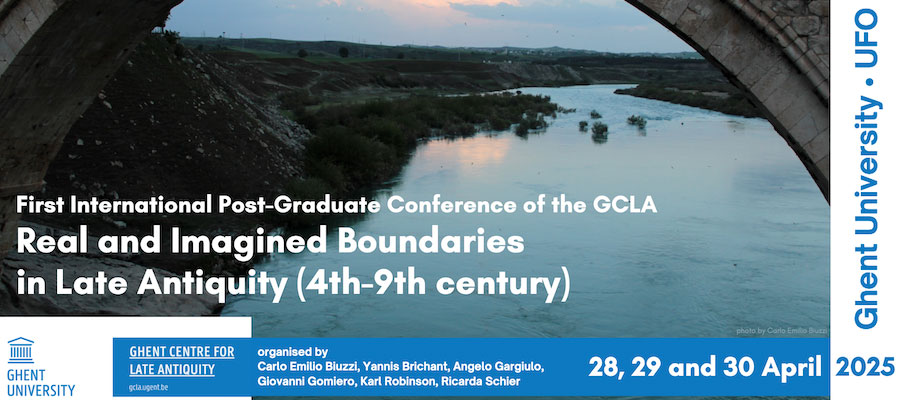Real and Imagined Boundaries in Late Antiquity (4th-9th century), First International Post-Graduate Conference of the Ghent Centre for Late Antiquity, Ghent University, April 28–30, 2025
In recent scholarship on Late Antiquity, attention has been increasingly paid to the concept of boundaries. Understood as frontiers, margins or limits, boundaries serve as defining lines between literary genres, group identities, geographical regions, religions, and more. Throughout history boundaries have created conflicts, intolerance, and distinctions. However, they can also be crossed: providing opportunities for coherence, tolerance, and exchange, boundaries are noteworthy above all for their multifaceted nature, their various dimensions and, paradoxically, their inherent permeability.
Studying Late Antiquity (4th-9th c.) from this perspective allows us to situate the period in its Eurasian and African context by considering differences and similarities within empires and beyond, focusing on what unites and divides. It also affords us the opportunity to consider disciplinary boundaries. Given the difficulty of studying such an intricate mixture of languages, cultures, sources, and contexts, inter-disciplinary cooperation has become crucial.
This conference aims to overcome “the tendency of most disciplines to consolidate their boundaries even as they attempt to broaden their scope and membership” (F. Trivellato, On the Margins, 2021, p. 249) by gathering junior scholars from different disciplinary fields; it also aims to discuss boundaries in all their manifestations, from a diverse range of angles. Through presentations, keynote lectures, and open conversations, we hope to stimulate new insights for postgraduate researchers of the Later Roman Empire, Late Antiquity and the Early Middle Ages.
Postgraduate researchers from the following fields are especially invited to participate: Arabic Studies, Archaeology, Art History, Biblical Studies, History, Jewish Studies, Linguistics, Literary Studies, Oriental Studies, Philosophy, Religious Studies, Theology.
We welcome researchers working with languages such as Arabic, Armenian, Coptic, Ethiopian, Georgian, Gothic, Greek, Hebrew, Latin, Persian, Slavonic, Sogdian, Syriac.
Possible topics may include but are not limited to:
- Building boundaries with(in) literary texts;
- Confessional and dogmatic boundaries between texts and reality;
- Translation as an activity to cross linguistic boundaries;
- Marginality as a category to define an inside-outside perspective;
- Physical, political, and military boundaries, between geography and literary representation;
- Conflicts within and outside empire(s);
- Traces of boundary markers in material and artistic culture;
- Perceived late-antique boundaries in academic publications;
- Trade routes and religious missions as connective and dividing factors.
We invite applications from postgraduate researchers (PhDs and advanced Masters).
Organizing Committee: Carlo E. Biuzzi, Yannis Brichant, Angelo Gargiulo, Giovanni Gomiero, Karl Robinson, Ricarda Schier
